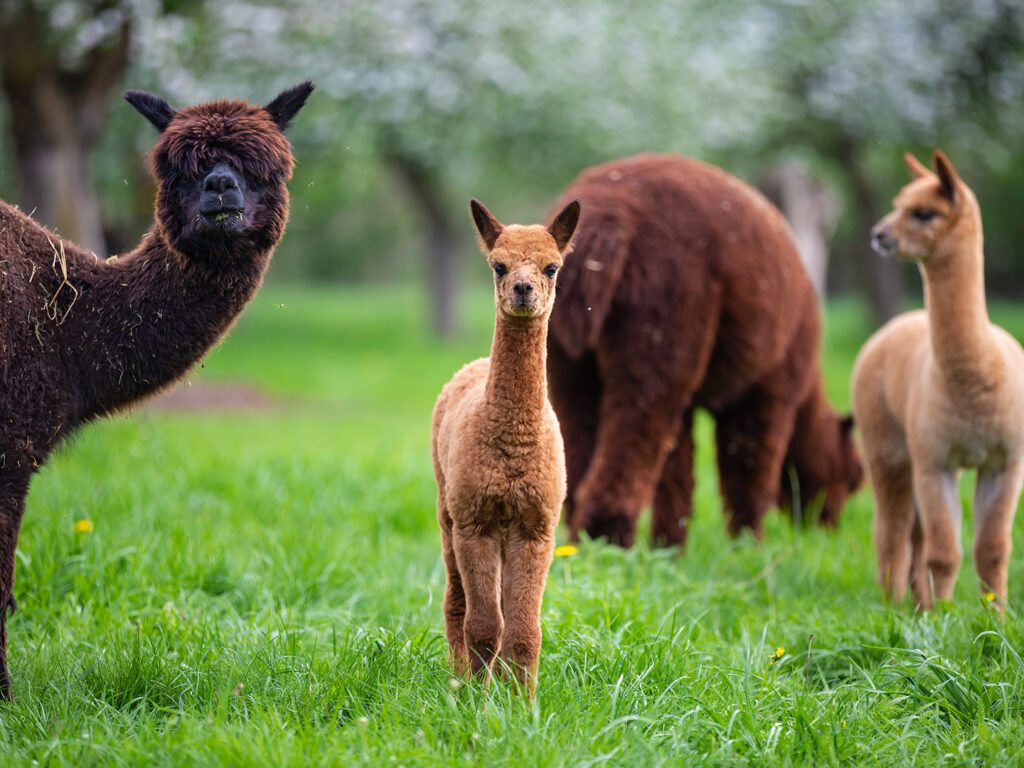First-Time Alpaca Ownership: Preparing Their New Home

Buying and raising alpacas can be alluring, yet prospective owners should make special living preparations that will keep these fleece animals comfortable when they reach their new home.
Dr. Dusty Nagy, a clinical associate professor at the Texas A&M School of Veterinary Medicine & Biomedical Sciences, says owners should specifically consider shelters, grazing land, and coat shearing when determining how to keep alpacas safe and healthy.
Housing And Grazing Land Preparations
When preparing alpaca housing, owners should first consider seasonal climates and weather protections to keep alpacas comfortable. Nagy suggests using shelters that can keep alpacas cool in the summer yet protect them from harsh seasonal weather as well.
“Shelters should have adequate shade that all animals can lay under while still allowing for adequate air flow; shelter that provides shade will also allow protection from adverse conditions since alpacas seek shelter in the rain or heavy winds,” Nagy said. “It is important to remember that alpacas are acclimatized to high altitudes and even when sheared, the summers, especially in the South, may be too hot. Having the capacity to run fans or provide other types of cooling is recommended for these animals in hot, humid summers.”
Since they are outside animals, alpacas also require fenced grazing areas so that they can feed off of healthy pastures.
“The ratio of alpacas to grazing area is difficult to determine, as the quality of the forage is important and all pastures are not created equally,” Nagy said. “Alpacas that remain in one large pasture all the time will contaminate a larger portion of that pasture with dung piles than if the same pasture was divided into smaller areas and the animals were moved between them. There should be no expectation, however, that people can house seven alpacas per acre or four to five per acre.”
It is also essential to keep alpacas separate from animals who can spread parasites or fatal diseases, including white-tailed deer and horses. This can be achieved by raising alpacas in separate enclosures and providing them with different pastures.
In addition, Nagy says intermittent cleaning of the communal dung pile — a pile that alpacas choose to commonly use for excrement — will keep pastures and animals healthy by removing any potential pathogens, such as parasite eggs.
Caring For An Alpaca’s Coat
Lastly, owners should prepare to spend time shearing an alpaca’s coat, minimizing the chance of them becoming entangled in fencing or overheating.
“While alpacas respect fences, which makes them easier to contain than many of our more traditional livestock species, they do not do well with barbed wire fences because their fiber coat can often become entangled,” Nagy said. “It is typically not their coat that gets them stuck in the first place, though, as they can get tangled for other reasons, such as they are spooked or are leaning through the fencing to graze on the other side.
“Alpacas are also prone to heat stress, which can be deadly if their fiber coat is not sheared, especially in the South, where it is often hot and humid,” she continued. “Shearing their coat will not eliminate the chance of heatstrokes, but it can lower the chances.”
Determining whether an owner or a professional shears an alpaca ultimately depends on experience.
“Owners who have handled shears and are comfortable with the process can certainly shear their own animals, but shears can cause significant wounds on the skin and, occasionally, deeper tissues if you are not careful,” Nagy said. “If it is not something people have done before, I recommend a professional, who will be much quicker, which also decreases the stress to the animal.”
While alpacas can be relatively easy to care for, they are still livestock animals that require shelter for protection, grazing land for food, and shearing for good health and safety. The more prepared you are, the smoother owning alpacas will be, especially if it is your first time owning such a cute, yet unique, animal.
Pet Talk is a service of the School of Veterinary Medicine & Biomedical Sciences, Texas A&M University. Stories can be viewed on the web at vetmed.tamu.edu/news/pet-talk. Suggestions for future topics may be directed to vmbs-editor@tamu.edu.


